Employability Skills, SME Challenges, and Globalisation Strategies
VerifiedAdded on 2023/01/19
|7
|1984
|84
Essay
AI Summary
This essay explores two main topics: employability and the globalization of Small and Medium Enterprises (SMEs). The first part defines employability, highlighting essential 21st-century skills like critical thinking and creativity, alongside personal attributes such as optimism and communication. It discusses how to develop these skills for future workplace success. The second part focuses on SMEs, defining them and identifying major challenges that hinder their global expansion, such as competition and resource limitations. It then proposes solutions, emphasizing the importance of effective strategies and a culture of internationalism to overcome these obstacles and achieve success in foreign markets. The essay concludes by summarizing the key insights regarding employability skills and SME globalization strategies.

2 Questions
Paraphrase This Document
Need a fresh take? Get an instant paraphrase of this document with our AI Paraphraser
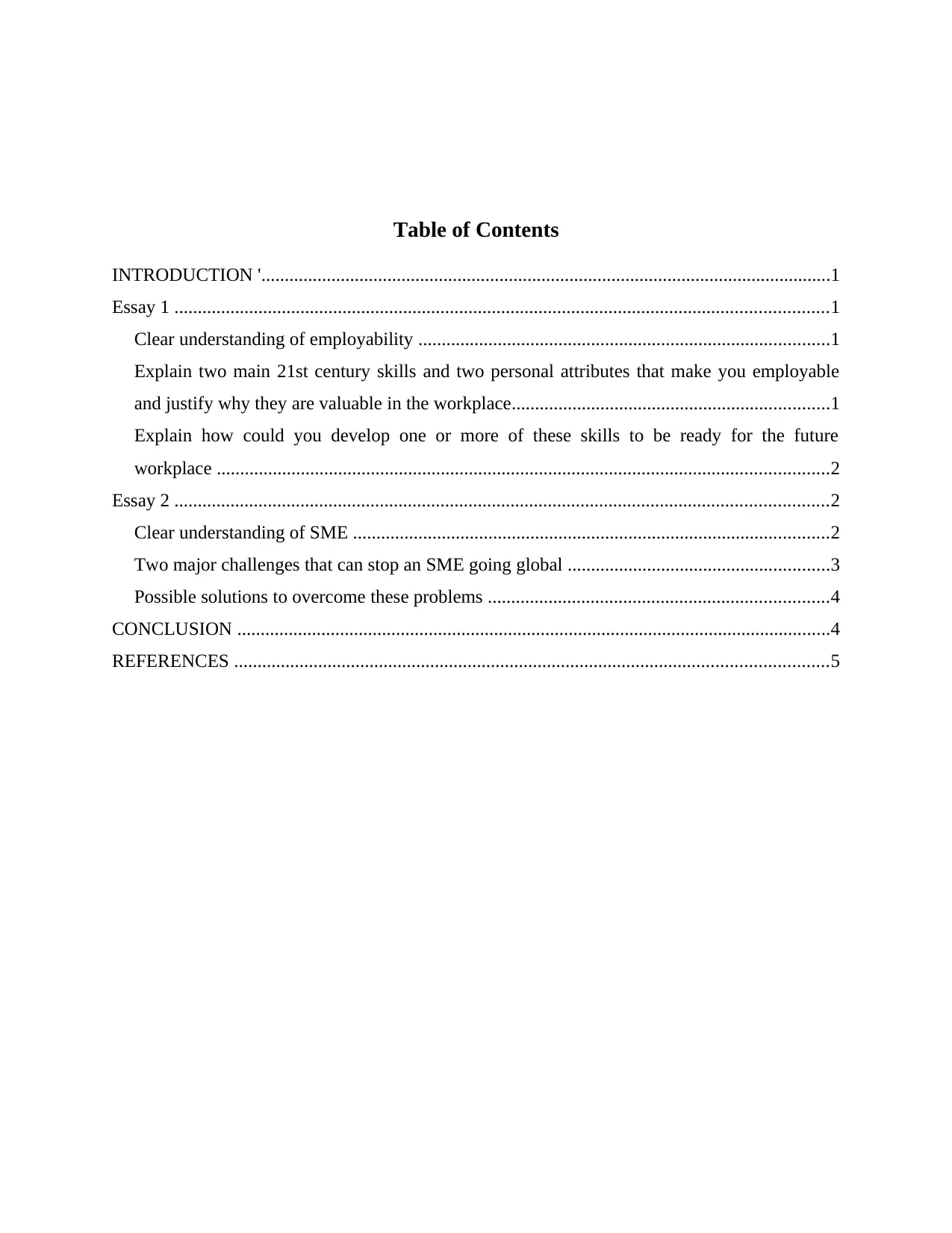
Table of Contents
INTRODUCTION '..........................................................................................................................1
Essay 1 ............................................................................................................................................1
Clear understanding of employability ........................................................................................1
Explain two main 21st century skills and two personal attributes that make you employable
and justify why they are valuable in the workplace....................................................................1
Explain how could you develop one or more of these skills to be ready for the future
workplace ...................................................................................................................................2
Essay 2 ............................................................................................................................................2
Clear understanding of SME ......................................................................................................2
Two major challenges that can stop an SME going global ........................................................3
Possible solutions to overcome these problems .........................................................................4
CONCLUSION ...............................................................................................................................4
REFERENCES ...............................................................................................................................5
INTRODUCTION '..........................................................................................................................1
Essay 1 ............................................................................................................................................1
Clear understanding of employability ........................................................................................1
Explain two main 21st century skills and two personal attributes that make you employable
and justify why they are valuable in the workplace....................................................................1
Explain how could you develop one or more of these skills to be ready for the future
workplace ...................................................................................................................................2
Essay 2 ............................................................................................................................................2
Clear understanding of SME ......................................................................................................2
Two major challenges that can stop an SME going global ........................................................3
Possible solutions to overcome these problems .........................................................................4
CONCLUSION ...............................................................................................................................4
REFERENCES ...............................................................................................................................5
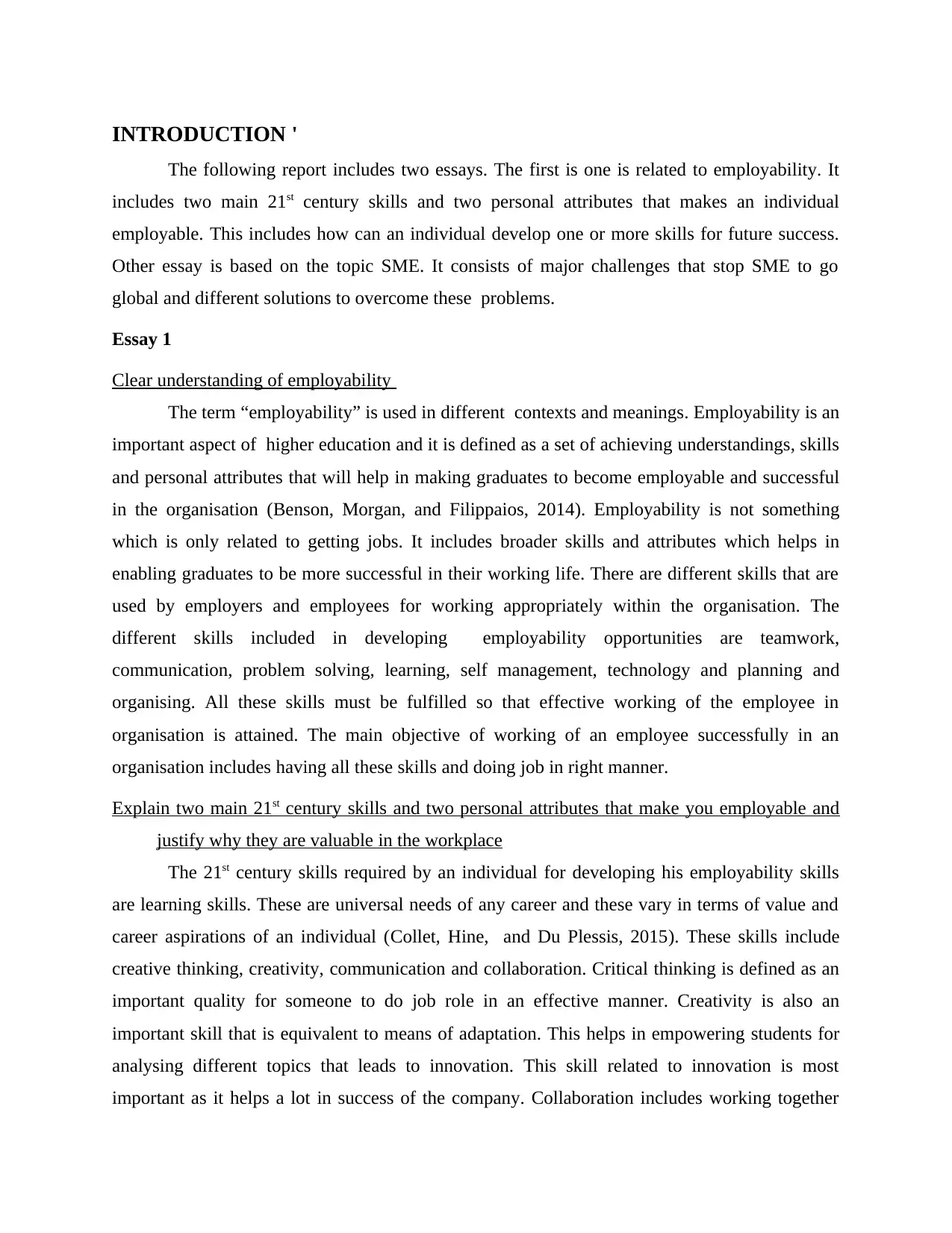
INTRODUCTION '
The following report includes two essays. The first is one is related to employability. It
includes two main 21st century skills and two personal attributes that makes an individual
employable. This includes how can an individual develop one or more skills for future success.
Other essay is based on the topic SME. It consists of major challenges that stop SME to go
global and different solutions to overcome these problems.
Essay 1
Clear understanding of employability
The term “employability” is used in different contexts and meanings. Employability is an
important aspect of higher education and it is defined as a set of achieving understandings, skills
and personal attributes that will help in making graduates to become employable and successful
in the organisation (Benson, Morgan, and Filippaios, 2014). Employability is not something
which is only related to getting jobs. It includes broader skills and attributes which helps in
enabling graduates to be more successful in their working life. There are different skills that are
used by employers and employees for working appropriately within the organisation. The
different skills included in developing employability opportunities are teamwork,
communication, problem solving, learning, self management, technology and planning and
organising. All these skills must be fulfilled so that effective working of the employee in
organisation is attained. The main objective of working of an employee successfully in an
organisation includes having all these skills and doing job in right manner.
Explain two main 21st century skills and two personal attributes that make you employable and
justify why they are valuable in the workplace
The 21st century skills required by an individual for developing his employability skills
are learning skills. These are universal needs of any career and these vary in terms of value and
career aspirations of an individual (Collet, Hine, and Du Plessis, 2015). These skills include
creative thinking, creativity, communication and collaboration. Critical thinking is defined as an
important quality for someone to do job role in an effective manner. Creativity is also an
important skill that is equivalent to means of adaptation. This helps in empowering students for
analysing different topics that leads to innovation. This skill related to innovation is most
important as it helps a lot in success of the company. Collaboration includes working together
The following report includes two essays. The first is one is related to employability. It
includes two main 21st century skills and two personal attributes that makes an individual
employable. This includes how can an individual develop one or more skills for future success.
Other essay is based on the topic SME. It consists of major challenges that stop SME to go
global and different solutions to overcome these problems.
Essay 1
Clear understanding of employability
The term “employability” is used in different contexts and meanings. Employability is an
important aspect of higher education and it is defined as a set of achieving understandings, skills
and personal attributes that will help in making graduates to become employable and successful
in the organisation (Benson, Morgan, and Filippaios, 2014). Employability is not something
which is only related to getting jobs. It includes broader skills and attributes which helps in
enabling graduates to be more successful in their working life. There are different skills that are
used by employers and employees for working appropriately within the organisation. The
different skills included in developing employability opportunities are teamwork,
communication, problem solving, learning, self management, technology and planning and
organising. All these skills must be fulfilled so that effective working of the employee in
organisation is attained. The main objective of working of an employee successfully in an
organisation includes having all these skills and doing job in right manner.
Explain two main 21st century skills and two personal attributes that make you employable and
justify why they are valuable in the workplace
The 21st century skills required by an individual for developing his employability skills
are learning skills. These are universal needs of any career and these vary in terms of value and
career aspirations of an individual (Collet, Hine, and Du Plessis, 2015). These skills include
creative thinking, creativity, communication and collaboration. Critical thinking is defined as an
important quality for someone to do job role in an effective manner. Creativity is also an
important skill that is equivalent to means of adaptation. This helps in empowering students for
analysing different topics that leads to innovation. This skill related to innovation is most
important as it helps a lot in success of the company. Collaboration includes working together
⊘ This is a preview!⊘
Do you want full access?
Subscribe today to unlock all pages.

Trusted by 1+ million students worldwide
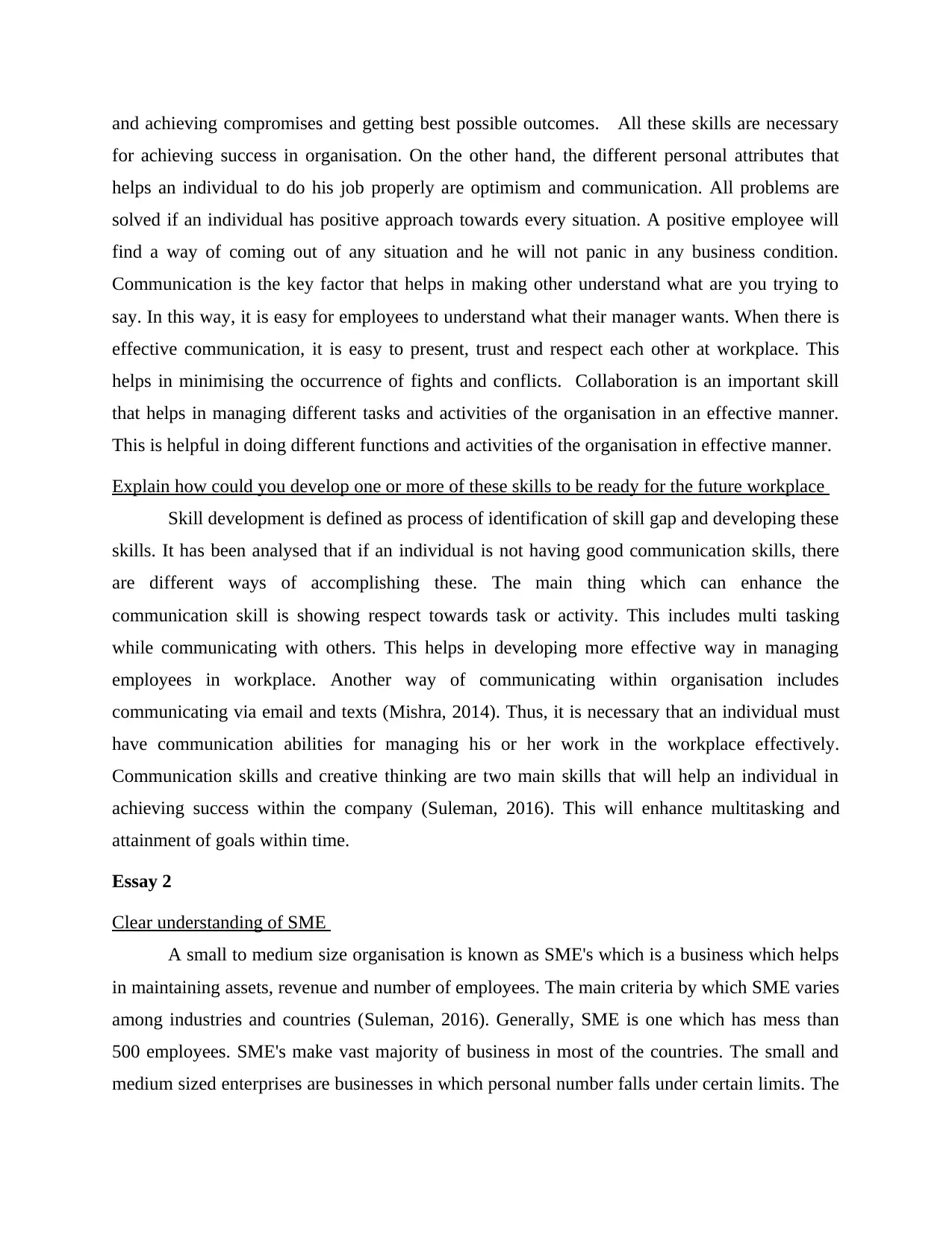
and achieving compromises and getting best possible outcomes. All these skills are necessary
for achieving success in organisation. On the other hand, the different personal attributes that
helps an individual to do his job properly are optimism and communication. All problems are
solved if an individual has positive approach towards every situation. A positive employee will
find a way of coming out of any situation and he will not panic in any business condition.
Communication is the key factor that helps in making other understand what are you trying to
say. In this way, it is easy for employees to understand what their manager wants. When there is
effective communication, it is easy to present, trust and respect each other at workplace. This
helps in minimising the occurrence of fights and conflicts. Collaboration is an important skill
that helps in managing different tasks and activities of the organisation in an effective manner.
This is helpful in doing different functions and activities of the organisation in effective manner.
Explain how could you develop one or more of these skills to be ready for the future workplace
Skill development is defined as process of identification of skill gap and developing these
skills. It has been analysed that if an individual is not having good communication skills, there
are different ways of accomplishing these. The main thing which can enhance the
communication skill is showing respect towards task or activity. This includes multi tasking
while communicating with others. This helps in developing more effective way in managing
employees in workplace. Another way of communicating within organisation includes
communicating via email and texts (Mishra, 2014). Thus, it is necessary that an individual must
have communication abilities for managing his or her work in the workplace effectively.
Communication skills and creative thinking are two main skills that will help an individual in
achieving success within the company (Suleman, 2016). This will enhance multitasking and
attainment of goals within time.
Essay 2
Clear understanding of SME
A small to medium size organisation is known as SME's which is a business which helps
in maintaining assets, revenue and number of employees. The main criteria by which SME varies
among industries and countries (Suleman, 2016). Generally, SME is one which has mess than
500 employees. SME's make vast majority of business in most of the countries. The small and
medium sized enterprises are businesses in which personal number falls under certain limits. The
for achieving success in organisation. On the other hand, the different personal attributes that
helps an individual to do his job properly are optimism and communication. All problems are
solved if an individual has positive approach towards every situation. A positive employee will
find a way of coming out of any situation and he will not panic in any business condition.
Communication is the key factor that helps in making other understand what are you trying to
say. In this way, it is easy for employees to understand what their manager wants. When there is
effective communication, it is easy to present, trust and respect each other at workplace. This
helps in minimising the occurrence of fights and conflicts. Collaboration is an important skill
that helps in managing different tasks and activities of the organisation in an effective manner.
This is helpful in doing different functions and activities of the organisation in effective manner.
Explain how could you develop one or more of these skills to be ready for the future workplace
Skill development is defined as process of identification of skill gap and developing these
skills. It has been analysed that if an individual is not having good communication skills, there
are different ways of accomplishing these. The main thing which can enhance the
communication skill is showing respect towards task or activity. This includes multi tasking
while communicating with others. This helps in developing more effective way in managing
employees in workplace. Another way of communicating within organisation includes
communicating via email and texts (Mishra, 2014). Thus, it is necessary that an individual must
have communication abilities for managing his or her work in the workplace effectively.
Communication skills and creative thinking are two main skills that will help an individual in
achieving success within the company (Suleman, 2016). This will enhance multitasking and
attainment of goals within time.
Essay 2
Clear understanding of SME
A small to medium size organisation is known as SME's which is a business which helps
in maintaining assets, revenue and number of employees. The main criteria by which SME varies
among industries and countries (Suleman, 2016). Generally, SME is one which has mess than
500 employees. SME's make vast majority of business in most of the countries. The small and
medium sized enterprises are businesses in which personal number falls under certain limits. The
Paraphrase This Document
Need a fresh take? Get an instant paraphrase of this document with our AI Paraphraser
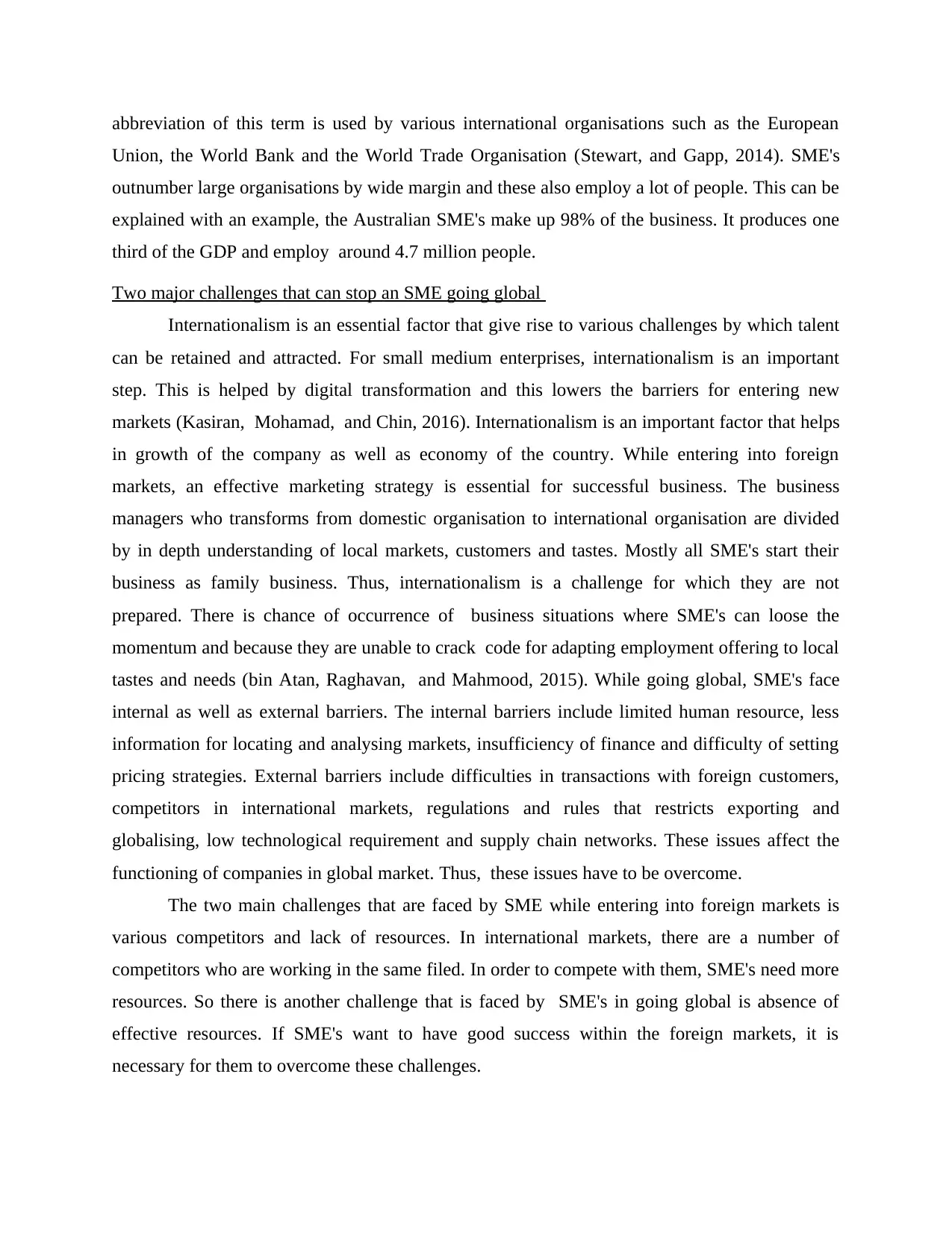
abbreviation of this term is used by various international organisations such as the European
Union, the World Bank and the World Trade Organisation (Stewart, and Gapp, 2014). SME's
outnumber large organisations by wide margin and these also employ a lot of people. This can be
explained with an example, the Australian SME's make up 98% of the business. It produces one
third of the GDP and employ around 4.7 million people.
Two major challenges that can stop an SME going global
Internationalism is an essential factor that give rise to various challenges by which talent
can be retained and attracted. For small medium enterprises, internationalism is an important
step. This is helped by digital transformation and this lowers the barriers for entering new
markets (Kasiran, Mohamad, and Chin, 2016). Internationalism is an important factor that helps
in growth of the company as well as economy of the country. While entering into foreign
markets, an effective marketing strategy is essential for successful business. The business
managers who transforms from domestic organisation to international organisation are divided
by in depth understanding of local markets, customers and tastes. Mostly all SME's start their
business as family business. Thus, internationalism is a challenge for which they are not
prepared. There is chance of occurrence of business situations where SME's can loose the
momentum and because they are unable to crack code for adapting employment offering to local
tastes and needs (bin Atan, Raghavan, and Mahmood, 2015). While going global, SME's face
internal as well as external barriers. The internal barriers include limited human resource, less
information for locating and analysing markets, insufficiency of finance and difficulty of setting
pricing strategies. External barriers include difficulties in transactions with foreign customers,
competitors in international markets, regulations and rules that restricts exporting and
globalising, low technological requirement and supply chain networks. These issues affect the
functioning of companies in global market. Thus, these issues have to be overcome.
The two main challenges that are faced by SME while entering into foreign markets is
various competitors and lack of resources. In international markets, there are a number of
competitors who are working in the same filed. In order to compete with them, SME's need more
resources. So there is another challenge that is faced by SME's in going global is absence of
effective resources. If SME's want to have good success within the foreign markets, it is
necessary for them to overcome these challenges.
Union, the World Bank and the World Trade Organisation (Stewart, and Gapp, 2014). SME's
outnumber large organisations by wide margin and these also employ a lot of people. This can be
explained with an example, the Australian SME's make up 98% of the business. It produces one
third of the GDP and employ around 4.7 million people.
Two major challenges that can stop an SME going global
Internationalism is an essential factor that give rise to various challenges by which talent
can be retained and attracted. For small medium enterprises, internationalism is an important
step. This is helped by digital transformation and this lowers the barriers for entering new
markets (Kasiran, Mohamad, and Chin, 2016). Internationalism is an important factor that helps
in growth of the company as well as economy of the country. While entering into foreign
markets, an effective marketing strategy is essential for successful business. The business
managers who transforms from domestic organisation to international organisation are divided
by in depth understanding of local markets, customers and tastes. Mostly all SME's start their
business as family business. Thus, internationalism is a challenge for which they are not
prepared. There is chance of occurrence of business situations where SME's can loose the
momentum and because they are unable to crack code for adapting employment offering to local
tastes and needs (bin Atan, Raghavan, and Mahmood, 2015). While going global, SME's face
internal as well as external barriers. The internal barriers include limited human resource, less
information for locating and analysing markets, insufficiency of finance and difficulty of setting
pricing strategies. External barriers include difficulties in transactions with foreign customers,
competitors in international markets, regulations and rules that restricts exporting and
globalising, low technological requirement and supply chain networks. These issues affect the
functioning of companies in global market. Thus, these issues have to be overcome.
The two main challenges that are faced by SME while entering into foreign markets is
various competitors and lack of resources. In international markets, there are a number of
competitors who are working in the same filed. In order to compete with them, SME's need more
resources. So there is another challenge that is faced by SME's in going global is absence of
effective resources. If SME's want to have good success within the foreign markets, it is
necessary for them to overcome these challenges.
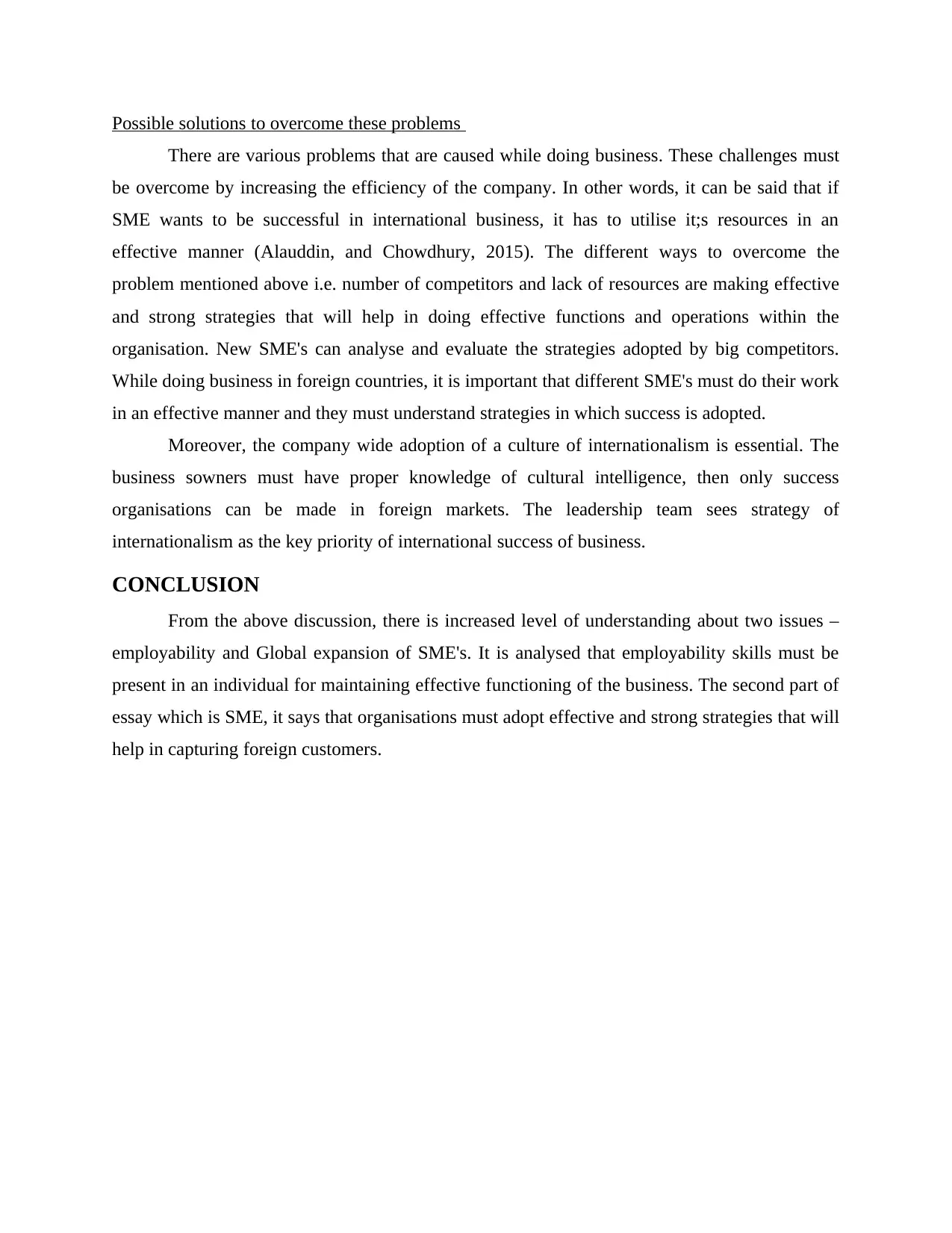
Possible solutions to overcome these problems
There are various problems that are caused while doing business. These challenges must
be overcome by increasing the efficiency of the company. In other words, it can be said that if
SME wants to be successful in international business, it has to utilise it;s resources in an
effective manner (Alauddin, and Chowdhury, 2015). The different ways to overcome the
problem mentioned above i.e. number of competitors and lack of resources are making effective
and strong strategies that will help in doing effective functions and operations within the
organisation. New SME's can analyse and evaluate the strategies adopted by big competitors.
While doing business in foreign countries, it is important that different SME's must do their work
in an effective manner and they must understand strategies in which success is adopted.
Moreover, the company wide adoption of a culture of internationalism is essential. The
business sowners must have proper knowledge of cultural intelligence, then only success
organisations can be made in foreign markets. The leadership team sees strategy of
internationalism as the key priority of international success of business.
CONCLUSION
From the above discussion, there is increased level of understanding about two issues –
employability and Global expansion of SME's. It is analysed that employability skills must be
present in an individual for maintaining effective functioning of the business. The second part of
essay which is SME, it says that organisations must adopt effective and strong strategies that will
help in capturing foreign customers.
There are various problems that are caused while doing business. These challenges must
be overcome by increasing the efficiency of the company. In other words, it can be said that if
SME wants to be successful in international business, it has to utilise it;s resources in an
effective manner (Alauddin, and Chowdhury, 2015). The different ways to overcome the
problem mentioned above i.e. number of competitors and lack of resources are making effective
and strong strategies that will help in doing effective functions and operations within the
organisation. New SME's can analyse and evaluate the strategies adopted by big competitors.
While doing business in foreign countries, it is important that different SME's must do their work
in an effective manner and they must understand strategies in which success is adopted.
Moreover, the company wide adoption of a culture of internationalism is essential. The
business sowners must have proper knowledge of cultural intelligence, then only success
organisations can be made in foreign markets. The leadership team sees strategy of
internationalism as the key priority of international success of business.
CONCLUSION
From the above discussion, there is increased level of understanding about two issues –
employability and Global expansion of SME's. It is analysed that employability skills must be
present in an individual for maintaining effective functioning of the business. The second part of
essay which is SME, it says that organisations must adopt effective and strong strategies that will
help in capturing foreign customers.
⊘ This is a preview!⊘
Do you want full access?
Subscribe today to unlock all pages.

Trusted by 1+ million students worldwide
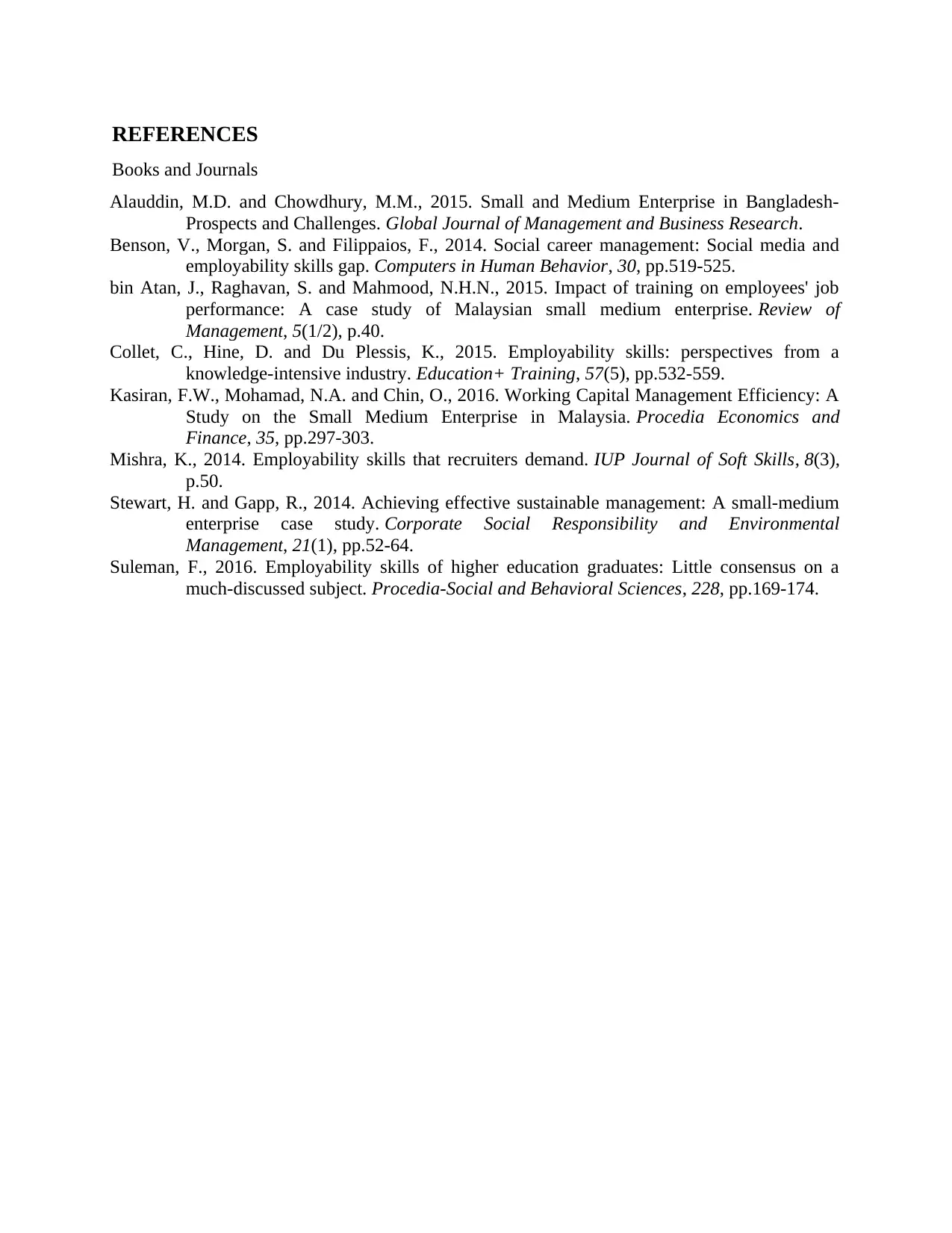
REFERENCES
Books and Journals
Alauddin, M.D. and Chowdhury, M.M., 2015. Small and Medium Enterprise in Bangladesh-
Prospects and Challenges. Global Journal of Management and Business Research.
Benson, V., Morgan, S. and Filippaios, F., 2014. Social career management: Social media and
employability skills gap. Computers in Human Behavior, 30, pp.519-525.
bin Atan, J., Raghavan, S. and Mahmood, N.H.N., 2015. Impact of training on employees' job
performance: A case study of Malaysian small medium enterprise. Review of
Management, 5(1/2), p.40.
Collet, C., Hine, D. and Du Plessis, K., 2015. Employability skills: perspectives from a
knowledge-intensive industry. Education+ Training, 57(5), pp.532-559.
Kasiran, F.W., Mohamad, N.A. and Chin, O., 2016. Working Capital Management Efficiency: A
Study on the Small Medium Enterprise in Malaysia. Procedia Economics and
Finance, 35, pp.297-303.
Mishra, K., 2014. Employability skills that recruiters demand. IUP Journal of Soft Skills, 8(3),
p.50.
Stewart, H. and Gapp, R., 2014. Achieving effective sustainable management: A small‐medium
enterprise case study. Corporate Social Responsibility and Environmental
Management, 21(1), pp.52-64.
Suleman, F., 2016. Employability skills of higher education graduates: Little consensus on a
much-discussed subject. Procedia-Social and Behavioral Sciences, 228, pp.169-174.
Books and Journals
Alauddin, M.D. and Chowdhury, M.M., 2015. Small and Medium Enterprise in Bangladesh-
Prospects and Challenges. Global Journal of Management and Business Research.
Benson, V., Morgan, S. and Filippaios, F., 2014. Social career management: Social media and
employability skills gap. Computers in Human Behavior, 30, pp.519-525.
bin Atan, J., Raghavan, S. and Mahmood, N.H.N., 2015. Impact of training on employees' job
performance: A case study of Malaysian small medium enterprise. Review of
Management, 5(1/2), p.40.
Collet, C., Hine, D. and Du Plessis, K., 2015. Employability skills: perspectives from a
knowledge-intensive industry. Education+ Training, 57(5), pp.532-559.
Kasiran, F.W., Mohamad, N.A. and Chin, O., 2016. Working Capital Management Efficiency: A
Study on the Small Medium Enterprise in Malaysia. Procedia Economics and
Finance, 35, pp.297-303.
Mishra, K., 2014. Employability skills that recruiters demand. IUP Journal of Soft Skills, 8(3),
p.50.
Stewart, H. and Gapp, R., 2014. Achieving effective sustainable management: A small‐medium
enterprise case study. Corporate Social Responsibility and Environmental
Management, 21(1), pp.52-64.
Suleman, F., 2016. Employability skills of higher education graduates: Little consensus on a
much-discussed subject. Procedia-Social and Behavioral Sciences, 228, pp.169-174.
1 out of 7
Related Documents
Your All-in-One AI-Powered Toolkit for Academic Success.
+13062052269
info@desklib.com
Available 24*7 on WhatsApp / Email
![[object Object]](/_next/static/media/star-bottom.7253800d.svg)
Unlock your academic potential
Copyright © 2020–2026 A2Z Services. All Rights Reserved. Developed and managed by ZUCOL.





